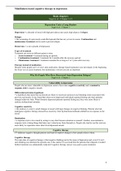Samenvatting
Summary Mindfulness based cognitive therapy for depression
- Instelling
- Universiteit Van Amsterdam (UvA)
Summary of the book Mindfulness based cognitive therapy for depression. For the course 'Mindfulness across the lifespan' at the UvA.
[Meer zien]





